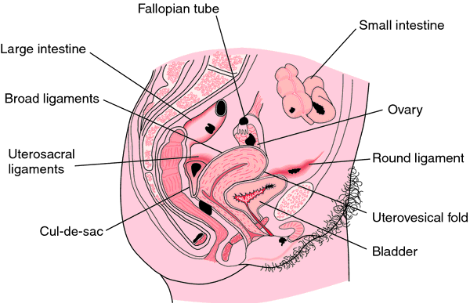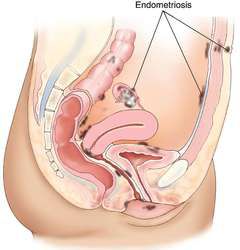
Women Diseases
Endometriosis
Endometriosis is a condition resulting from the appearance of endometrial tissue outside the uterus and causing pelvic pain. Menstrual pain. Pain in the lower abdomen that begins a day or two before themenstrual period starts and continues through to the end is typical of endometriosis.Some women also report lower back aches and pain during urination and bowelmovement, especially during their periods. Painful sexual intercourse. Pressure on the vagina and cervix causes severe pain forsome women. Abnormal bleeding. Heavy menstrual periods, irregular bleeding, and spotting arecommon features of endometriosis.Infertility. There is a strong association between endometriosis and infertility,although the reasons for this have not been fully explained. It is thought that the buildup of scar tissue and adhesions blocks the fallopian tubes and prevents the ovariesfrom releasing eggs. Endometriosis may also affect fertility by causing hormonal irregularities and a higher rate of early miscarriage.
Please see the patient review for Dr. Melinda Lei' Chinese medicine treatments on endometriosis:
http://www.yelp.com/biz/lei-acupuncture-and-herb-sunnyvale
Lucy L, San Jose, CA
"I have been having sharp pain in my lower abdomen due to endometriosis. Aside from the pain, endometriosis has affected me in my overall energy, poor appetite due to hormonal imbalance. Dr Lei treated me with herbs and acupuncture for 6 weeks. The degree of pain have reduced and my overall health has improved. Dr. Lei is a caring physician and I will continue my treatment."
According to the endometriosis patients record of more than one year, those patients were free from the pain and other symtoms that mention above.
Endometrial cancer is a type of cancer that begins in the uterus. The uterus is the hollow, pear-shaped pelvic organ in women where fetal development occurs. Endometrial cancer begins in the layer of cells that form the lining (endometrium) of the uterus. Endometrial cancer is sometimes called uterine cancer. Other types of cancer can form in the uterus, including uterine sarcoma, but they are much less common than endometrial cancer. Endometrial cancer is often detected at an early stage because it frequently produces abnormal vaginal bleeding, which prompts women to see their doctors. If endometrial cancer is discovered early, removing the uterus surgically often cures endometrial cancer.
- Vaginal bleeding after menopause
- Bleeding between periods
- An abnormal, watery or blood-tinged discharge from your vagina
- Pelvic pain
Uterine fibroids
Uterine fibroids are noncancerous growths of the uterus that often appear during childbearing years. Also called leiomyomas (lie-o-my-O-muhs) or myomas, uterine fibroids aren't associated with an increased risk of uterine cancer and almost never develop into cancer.
- Heavy menstrual bleeding
- Prolonged menstrual periods — seven days or more of menstrual bleeding
- Pelvic pressure or pain
- Frequent urination
- Difficulty emptying your bladder
- Constipation, Backache or leg pains
Ovarian cysts
Ovarian are fluid-filled sacs or pockets within or on the surface of an ovary Women have two ovaries — each about the size and shape of an almond — located on each side of the uterus. Eggs (ova) develop and mature in the ovaries and are released in monthly cycles during your childbearing years.
-
Pelvic pain — a dull ache that may radiate to your lower back and thighs
-
Pelvic pain shortly before your period begins or just before it ends
-
Pelvic pain during intercourse (dyspareunia)
-
Pain during bowel movements or pressure on your bowels
-
Nausea, vomiting or breast tenderness like that experienced during pregnancy
-
Fullness or heaviness in your abdomen
-
Pressure on your bladder that causes you to urinate more frequently or have difficulty emptying your bladder completely
Breast Hyperplasia
It can occur in the ducts (atypical ductal hyperplasia or ADH) or the lobules (atypical lobular hyperplasia or ALH). Having atypical ductal hyperplasia has been shown to slightly increase the risk of developing breast cancer in the future. Atypical lobular hyperplasia is a form of lobular neoplasia.
The most common symptoms of hyperplasia are lumps on the breast, although there lumps do not recessarily indicate hyperbplasia (or, for that matter, breast cancer). In fact, 50 to 90 percent of all women, at some point in their lives before they reach menopause, experience breast pain, lumps or nipple discharge. If you have any of these conditions, please see a doctor immediately. Even if there are no symptoms, however, hyperplasia may show up during a routine breast exam or mammogram.
Mastitis
Mastitis is an infection of the breast tissue that results in breast pain, swelling, warmth and redness. Patient also might have fever and chills. Mastitis most commonly affects women who are breast-feeding (lactation mastitis), although sometimes this condition can occur in women who aren't breast-feeding. Sometimes mastitis leads a mother to wean her baby before she intends to, but continuing to breast-feed, even while taking an antibiotic for the mastitis, is better for you and your baby.
- Breast tenderness or warmth to the touch
- Generally feeling ill (malaise)
- Breast swelling
- Pain or a burning sensation continuously or while breast-feeding
- Skin redness, often in a wedge-shaped pattern
- Fever of 101 F (38.3 C) or greater
Vaginitis: vaginitis is an inflammation of the vagina that can result in discharge, itching and pain. The cause is usually a change in the normal balance of vaginal bacteria or an infection. Vaginitis can also result from reduced estrogen levels after menopause. The most common types of vaginitis are: Bacterial vaginosis, which results from overgrowth of one of several organisms normally present in your vagina. Yeast infections, which are usually caused by a naturally occurring fungus called Candida albicans. Trichomoniasis, which is caused by a parasite and is commonly transmitted by sexual intercourse. Vaginal atrophy (atrophic vaginitis), which results from reduced estrogen levels after menopause.
Vaginitis signs and symptoms may include:
- Change in color, odor or amount of discharge from your vagina
- Vaginal itching or irritation
- Pain during intercourse
- Painful urination
- Light vaginal bleeding or spotting
Dr. Melinda Lei treated endometriosis, uterine fibroids, ovarian cysts, breast hyperplasia, mastitis and vanitis with acupuncture and nature herbs with her family formulas. Please consider a natural treatment before choosing any antibiotics and surgeries.
WX , 38 years old (Los Gatos) :
I had suffered vaginitis for more than 2 years before I knew Dr. Melinda Lei. The itching and burning drove me crazy! my friend recommended me to see Dr. Melinda Lei, a professional Chinese Doctor. She treated my vaginitis with acupuncture and herbs in 2 cycles. So far I have been totally free from that uncomfortable vaginitis about one year. My life quality was highly improved. Dr. Lei also treated my cold, coughing, headache as well as other women disease. I recommend Dr. Melinda Lei to all my friends.
Urinary Tract Infections (UTI):A urinary tract infection (UTI) is an infection in any part of your urinary system — your kidneys, ureters, bladder and urethra. Most infections involve the lower urinary tract — the bladder and the urethra.Women are at greater risk of developing a UTI than men are. Infection limited to your bladder can be painful and annoying. However, serious consequences can occur if a UTI spreads to your kidneys.
UTI signs and symptoms may include:
- A strong, persistent urge to urinate
- A burning sensation when urinating
- Passing frequent, small amounts of urine
- Urine that appears cloudy
- Urine that appears red, bright pink or cola-colored — a sign of blood in the urine
- Strong-smelling urine
- Pelvic pain, in women — especially in the center of the pelvis and around the area of the pubic bone
Sterility
Sterility refers to inability to get pregnant in a women who is married and lived for more than three years with her husband whose productive function is normal, and no contraception is taken; or inability to get pregnant for more than two years without contraception in a woman who gave birth or had abortion. This disease is usually caused by disturbance of ovary secretion and ovum formation, or deformity of genital organs. It belongs to the category of “childlessness”, “no delivery” in Chinese Medicine. It is due to deficiency of kidney essence, liver depression with qi stagnancy, blockage of the uterus by phlegm-dampness, and blood stasis and cold coagulation, leading to insufficiency of the kidney in nourishing, hence the dysfunction of the Chong and Ren meridians.
Infertility: is defined as not being able to get pregnant despite having frequent, unprotected sex for at least a year for most people and six months in certain circumstances. Infertility may be due to a single cause in either you or your partner, or a combination of factors that may prevent a pregnancy from occurring or continuing. Fortunately, there are many safe and effective therapies for overcoming infertility. These treatments significantly improve the chances of becoming pregnant.
In general, you may consider seeing a doctor about infertility if you and your partner have been trying regularly to conceive for at least one year. You may consider being seen earlier if you're a woman and:
- You're age 35 to 40 and have been trying to conceive for six months or longer
- You're over age 40
- You menstruate irregularly or not at all
- You have known fertility problems
- You've been diagnosed with endometriosis or pelvic inflammatory disease
- You've had more than one miscarriage
- You've had prior cancer treatment
If you're a man, you may wish to be evaluated sooner if you have:
- A low sperm count or other problems with sperm
- Swelling in the scrotum (see 'varicocele' below)
- You have had a previous vasectomy
- Undergone prior scrotal or inguinal surgery
- Small testicles or problems with sexual function or desire
- Had prior cancer cancer treatment
- Desire to know your fertility status
Lactation
Lactation failure or deficiency, also known as agalactia or agalactorrhea, as well ashypogalactia or hypogalactorrhea, is a medical condition in which lactation is insufficient or fails completely due to an inadequacy of breast milk production and/or a failure of the milk let-down reflex in response to suckling following childbirth, resulting in an inability to properly breastfeed.
- Breastfeeding difficulties. Lactation failure. Galactorrhea.
- Fissure of the nipple.
- Breast engorgement.
- Diastasis symphysis pubis.
- Peripartum cardiomyopathy.
- Postpartum depression.
- Postpartum thyroiditis.
- Puerperal fever.
- Puerperal mastitis.
Migraine
Migraine is a recurrent throbbing headache that typically affects one side of the head and is often accompanied by nausea and disturbed vision.
Tension headache: it is the most common type of headache. It can cause mild, moderate, or intense pain in your head, neck, and behind your eyes. Some patients say that a tension headache feels like a tight band around their forehead.
Cluster headaches
Cluster headaches occur in cyclical patterns or clusters, are one of the most painful types of headache. A cluster headache commonly awakens you in the middle of the night with intense pain in or around one eye on one side of your head. Bouts of frequent attacks, known as cluster periods, can last from weeks to months, usually followed by remission periods when the headaches stop. During remission, no headaches occur for months and sometimes even years.Fortunately, cluster headache is rare and not life-threatening. Treatments can make cluster headache attacks shorter and less severe. In addition, medications can reduce the number of cluster headaches.


